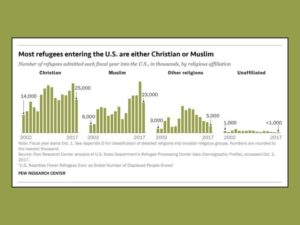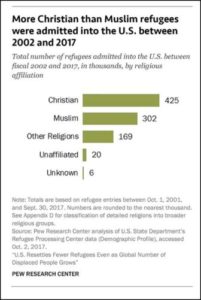Christians outnumber Muslim refugees to U.S. in last 15 years
WASHINGTON (RNS)—Muslim refugees to the United States, whose numbers have recently increased, have been far outpaced by Christians refugees over the last decade and a half.
 As the Trump Administration continues to enforce a travel ban affecting six Muslim-majority and other countries, a Pew Research Center report tracking the influx of displaced people finds 47 percent of refugee arrivals in fiscal 2017 were Christian and 43 percent were Muslim.
As the Trump Administration continues to enforce a travel ban affecting six Muslim-majority and other countries, a Pew Research Center report tracking the influx of displaced people finds 47 percent of refugee arrivals in fiscal 2017 were Christian and 43 percent were Muslim.
In the previous fiscal year, a record number of Muslim refugees were admitted. Pew noted 46 percent of refugees entering this country were Muslim, compared with 44 percent who were Christians.
“Even with the recent rise in the number of Muslim refugees, far more Christian than Muslim refugees have been admitted into the U.S. since fiscal 2002,” writes Phillip Connor, a senior researcher with Pew, in the new report.
In that 15-year period, almost 425,000 Christian refugees crossed U.S. borders, making up 46 percent of refugee arrivals. In comparison, 33 percent, or slightly more than 302,000, of admitted refugees were Muslim.
 Almost 170,000 refugees of other religions entered at the same time, including about 55,000 Hindus (mostly from Bhutan) and about 50,000 Buddhists (mostly from Burma and Bhutan). In addition, more than 20,000 with no religious affiliation, mostly from Vietnam and Cuba, entered the United States between the fiscal years of 2002 and 2017.
Almost 170,000 refugees of other religions entered at the same time, including about 55,000 Hindus (mostly from Bhutan) and about 50,000 Buddhists (mostly from Burma and Bhutan). In addition, more than 20,000 with no religious affiliation, mostly from Vietnam and Cuba, entered the United States between the fiscal years of 2002 and 2017.
In those 15 years, Christian arrivals represented nearly two dozen branches of Christianity, such as Armenian Christian and Ukrainian Orthodox. Those of non-Christian and non-Muslim faiths included Hare Krishnas and Zoroastrians.
Researchers found, overall, the United States is resettling fewer refugees even as the global number of displaced people is on the increase. If projections remain on track, the percentage of refugees admitted will be “lower even than the share admitted in 2001 and 2002, in the wake of the Sept. 11 terrorist attacks,” Connor said.
The Pew findings were based on analyses of reports from the U.N. High Commissioner for Refugees and the State Department.